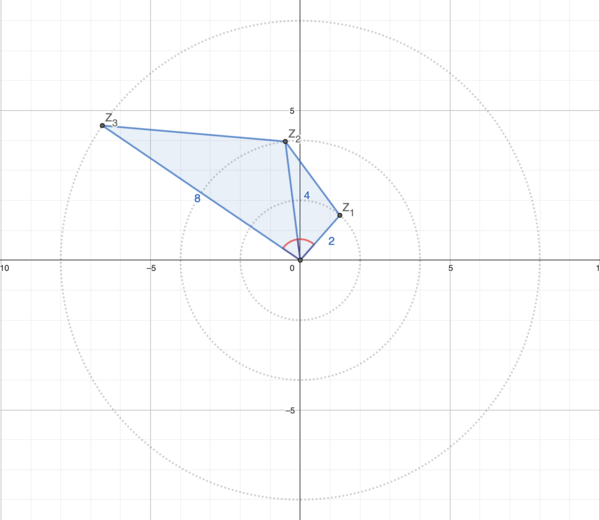2024 AMC 12B Problems/Problem 12
Contents
Problem
Suppose ![]() is a complex number with positive imaginary part, with real part greater than
is a complex number with positive imaginary part, with real part greater than ![]() , and with
, and with ![]() . In the complex plane, the four points
. In the complex plane, the four points ![]() ,
, ![]() ,
, ![]() , and
, and ![]() are the vertices of a quadrilateral with area
are the vertices of a quadrilateral with area ![]() . What is the imaginary part of
. What is the imaginary part of ![]() ?
?
![]()
Diagram
Solution 1
By making a rough estimate of where ![]() ,
, ![]() , and
, and ![]() are on the complex plane, we can draw a pretty accurate diagram (like above.)
are on the complex plane, we can draw a pretty accurate diagram (like above.)
Here, points ![]() ,
, ![]() , and
, and ![]() lie at the coordinates of
lie at the coordinates of ![]() ,
, ![]() , and
, and ![]() respectively, and
respectively, and ![]() is the origin.
is the origin.
We're given ![]() , so
, so ![]() and
and ![]() . This gives us
. This gives us ![]() ,
, ![]() , and
, and ![]() .
.
Additionally, we know that ![]() (since every power of
(since every power of ![]() rotates around the origin by the same angle.) We set these angles equal to
rotates around the origin by the same angle.) We set these angles equal to ![]() .
.
We have that \begin{align*} [OZ_1Z_2Z_3]&=[OZ_1Z_2]+[OZ_2Z_3] \\ &=\frac{1}{2}\cdot2\cdot4 \sin\theta+\frac{1}{2}\cdot4\cdot8 \sin\theta \\ &=4\sin\theta+16\sin\theta \\ &=20 \sin\theta \end{align*}
Since this is equal to ![]() , we have
, we have ![]() , so
, so ![]() .
.
Thus, ![]() .
.
~nm1728, ShortPeopleFartalot
Solution 2 (Shoelace Theorem)
We have the vertices:
![]() at
at![]() ,
, ![]() at
at![]() ,
, ![]() at
at![]() ,
, ![]() at
at![]()
The Shoelace formula for the area is:
![]()
![]()
![]()
![]()
![]()
![]()
![]() Given that the area is 15:
Given that the area is 15:
![]()
![]() Since
Since ![]() corresponds to a complex number
corresponds to a complex number ![]() with a positive imaginary part, we have:
with a positive imaginary part, we have:
![]()
![]()
Solution 3 (No Trig)
Let ![]() , so
, so ![]() and
and ![]() . Therefore, converting
. Therefore, converting ![]() from complex coordinates to Cartesian coordinates gives us the following.
from complex coordinates to Cartesian coordinates gives us the following.
![]()
![]()
![]()
![]()
The Shoelace Theorem tells us that the area is
![\[\frac{1}{2} \Bigg| \Big[ (0)(b) + (a)(2ab) + (a^2 - b^2)(3a^2 b - b^3) + (a^3 - 3ab^2)(0) \Big] - \Big[ (0)(a) + (b)(a^2 - b^2) + (2ab)(a^3 - 3ab^2) + (3a^2 b - b^3)(0) \Big] \Bigg|\]](http://latex.artofproblemsolving.com/8/2/c/82c1d36f8218aff4120364dd9851abe42983eec5.png)
![\[= \frac{1}{2} \Bigg| \Big[ (0) + (2a^2 b) + (3a^4 b - a^2 b^3 - 3a^2 b^3 + b^5) + (0) \Big] - \Big[ (0) + (a^2 b - b^3) + (2a^4 b - 6a^2 b^3) + (0) \Big] \Bigg|\]](http://latex.artofproblemsolving.com/7/b/2/7b246ed5734bf5031f1762fcb56d5f6be59f30c8.png)
![]()
![]()
We know that ![]() , so
, so ![]() . Substituting this gives us this:
. Substituting this gives us this:
![]()
![]()
![]()
![]()
In other words,
![]()
![]()
Solution 4
Video Solution 1 by SpreadTheMathLove
https://www.youtube.com/watch?v=OMR5MYtu11s&t=0s
See also
| 2024 AMC 12B (Problems • Answer Key • Resources) | |
| Preceded by Problem 11 |
Followed by Problem 13 |
| 1 • 2 • 3 • 4 • 5 • 6 • 7 • 8 • 9 • 10 • 11 • 12 • 13 • 14 • 15 • 16 • 17 • 18 • 19 • 20 • 21 • 22 • 23 • 24 • 25 | |
| All AMC 12 Problems and Solutions | |
The problems on this page are copyrighted by the Mathematical Association of America's American Mathematics Competitions. 










